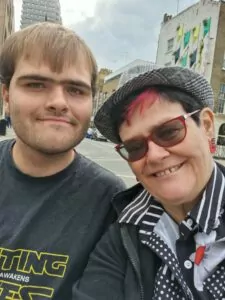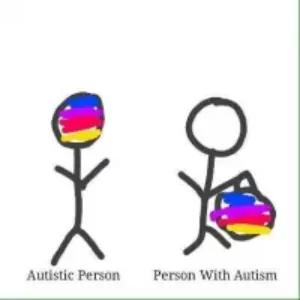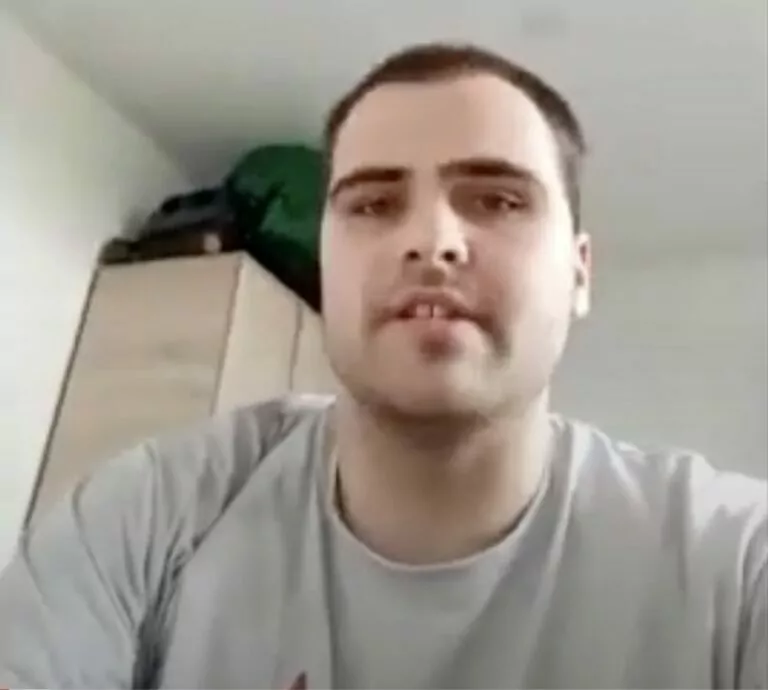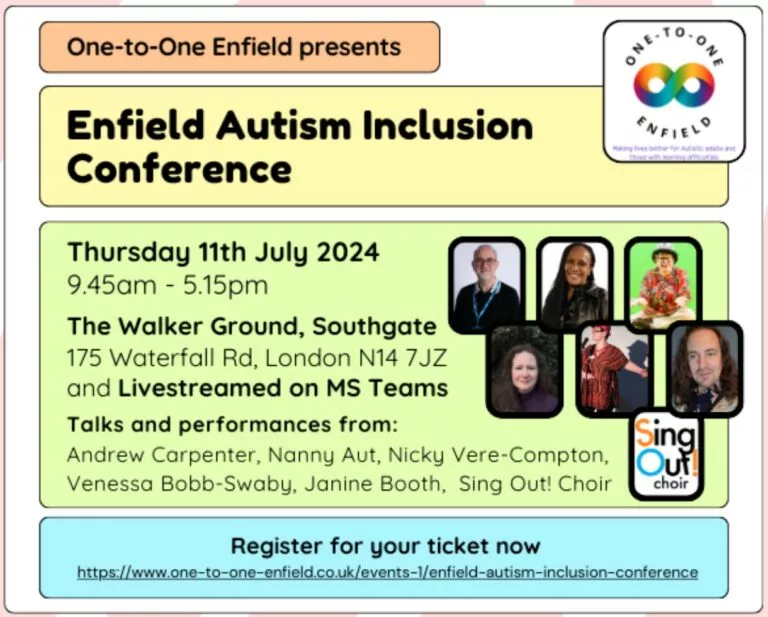An autistic sports and leisure participant speaks
In this interview – filmed for use in teaching sports and leisure centre workers about neurodiversity – Joe Booth, a young autistic adult, talk with Red in the Spectrum’s Janine Booth (his mum) about his experiences in sports and leisure.
You can watch this as a video and/or read the transcript of the interview below.
An autistic sports and leisure participant speaks
Red in the Spectrum: Hi Joe. You are 22 years old, you’re autistic and you are a keen participant in sports and leisure. Can you tell us what sports and leisure activities you do?
Joe: I’m with the doctor referral programme with Better, which only costs £23 a month for unlimited activities. It’s either that or it’s £45 a month plus £8 pound a swim, so I’m definitely going for the cheaper option.
Living in supported accommodation and being on anti-depressants is what gave me the GP referral scheme, so occasionally I do get checked in with a health professional at the Better centre who works for what’s called Healthwise, which is part of the scheme and checks blood pressure, height and weights, and they ask if you need any help with anything.
The activities I do within the leisure centre are swimming, yoga class, and I haven’t used a gym yet but I plan to.
Sports and leisure at school
R: Do you have any memories from your childhood of being involved in sport and leisure activities? What do you remember about PE lessons at school – do they still call it PE? I don’t know – What did you think of them? Did you enjoy them?
J: Within school, obviously we had PE lessons. I did not really enjoy them. The only thing I really liked about them was the fact that it wasn’t the typical sitting down, listening to the teacher for ages and doing paragraphs, which made it easier to do, and the fact that we were moving made it fun.
But what I didn’t like about it is we weren’t actually really being taught about physical health – we weren’t actually being taught about the benefits of physical exercise, how to know if you’re over-training and how it affects your physical and mental health overall, and we didn’t learn about anything like first aid.
So it wasn’t really a lesson about physical health, it was more just learning how to play football and basketball and cricket and other sports, which was useful but we didn’t learn about the actual impact that sport and physical exercise has on your health, because that’s a very important thing to learn, especially if you’re going to do a job in it.
R: That’s interesting, because it’s quite a common thing in autistic people to need to see the whole reason for doing something rather than just being taught how to do it. So, is that what was important to you, and that was the thing that was missing?
J: That’s part of it, but you don’t go to an English class and just simply read a book, and you don’t go to a maths class just count how many fingers you have – five – you got to learn about the subjects, you got to learn how it’s applicable to other parts of your life, and you got to learn how you can use it in the field of work when you’re older.
We learned that in every other subject, but we didn’t learn it in PE. Like PE, I felt, was just more of a break from lessons even though it was a lesson.
Taking up sports and leisure after leaving school
R: Since you left school and became a young adult, what motivated you to take up judo and boxing and other forms of exercise, sports and leisure?
J: Well, I started Judo when I was 19 and started boxing when I was 21, and what motivated me to take up those particular sports is the fact that they are martial arts and the fact that it involves a lot of cardiovascular exercise – so, exercise to help improve your stamina and endurance and speed.
And, martial arts from a self-defence perspective, albeit I have never been attacked in my adult life. But also because, as a lot of people would guess, going into a boxing class, you get to pretend that the punch bag is someone you really don’t like! You don’t have to show that anger in real life, so it’s a good outlet for any pent-up aggression you might have, and definitely an adrenaline workout.

R: Cool. So, if you were looking for an exercise, sports and leisure activity to take up, like a judo class, or boxing class, or a gym membership, or whatever, how would you go about finding it and what makes it easier for you to understand the information that’s presented to you?
J: How I would look for a class is simple: I just look on the internet. The good thing about the judo and boxing classes that I take is that we have good coaches, and when I say good coaches I don’t just mean polite and friendly, I mean ones who listen to you when you’re struggling to understand something.
That’s actually always been an issue in judo because they demonstrate something and then expect you to copy it, but what made it a lot easier to learn than in class like in school was the fact that there was just no pressure involved, it’s not like you’re making a job out of it or something.
It’s a leisure activity, so if they have to repeat something in school they just get so annoyed with you and just have a go at you for not listening and for looking out the window, and that was definitely a big struggle for me as an autistic student, but in judo and boxing, even if you were just not listening they wouldn’t care, they just repeat themselves.
So I think that what makes it easy to learn is the fact that they’re willing to adjust to every student individually.
Sports and leisure: the sensory environment
R: That’s good. So, sports and leisure centres are quite well known for being loud and big and busy, with bright lights and lots going on, and that can present a barrier to some autistic people because of the sensory overload and sensory input. Can you describe how that might be an issue for you?
J: That was definitely an issue for me when I was just starting to use the gym, when I was 17, when I was just discharged from a psychiatric unit and was as a result encouraged to do a lot of sport and exercise more often.
Every time I went to the gym in Hackney, where I’m from, it was loud inside and that’s mainly just because Hackney’s a loud area and the gym was always busy – no matter what time of the day, whether it was 6am or 9pm.
And not only that, but there were times when it would get too loud and there were a few people in there having freaking verbal fights and staff would not come in and stop it, and that would usually just be because they didn’t notice.
So, I think the way around that is just to have more staff availability within the gyms and other parts of the leisure centres and try to put on noise limits so that not only is it more inclusive for people with sensory overload, but also so people can concentrate on what they’re doing and don’t want to come across any verbal aggression amongst any strangers.
R: Yeah, that would be quite off-putting, wouldn’t it? What have your coaches in your classes done that has helped include you and make you feel at ease?
J: In boxing, every time I tell the coach that the music’s too loud, he turns it down and luckily I didn’t even have to explain. Well, I did explain that it’s because I’m autistic but I didn’t have to.
I think what really made him turn it down wasn’t even just the fact that he’s a nice guy. It was also the fact that he wants it to be the kind of environment where people can go and enjoy themselves, concentrate on what they’re doing and not have anything to complain about.
I think that that’s what has made boxing a good experience for me personally.
It’s just the simple fact that the coaches understand how complex everything is to learn, and they don’t judge you if you’ve lost focus on what they were saying and they’ve had to repeat themselves.
And also the fact that when I’ve asked them for help with remembering certain judo throws, to move up a belt, they would obviously help with that, but they would also try to help me stay as relaxed as possible by telling me “stick to the ones that you know you can do and not the ones you think you have to do”.
So, I think that what made judo a good experience for me is the fact that A. they don’t judge your learning method and B. they’re always there to help you, and they always want to take pressure off.
How can sports and leisure be more inclusive?
R: Thinking about the local leisure centre that you use, what would you change about it to make it more welcoming and inclusive for you?
J: Certain activities like yoga classes, which I do once a week, you have to book it in advance and that’s just simply to make sure that there’s enough space and that’s good, I think.
But for both autistics and neurotypicals, the way you book it can be a bit confusing, because you have to join a wait list and then you get an email as soon as a space turns up and if you don’t book it on time, the space will go away, but it might come back. So the method of booking for the yoga classes and other fitness classes that I’ve just described, it can be confusing for both autistics and neurotypicals because it often looks like they’ve booked a place when they haven’t.
R: Not only would I find that confusing, I think it would make me quite anxious as well. A simpler system for booking, without the anxiety of not knowing whether you’ve got a place or not …
J: And also – as some other players have said – more yoga classes, because even though there’s yoga classes on every junction in the area, money is the issue, because whilst I’m with that GP referral scheme at the leisure centre, I can do anything unlimited for £23 pound a month, whereas a lot of yoga clubs would take like £15 a session.
Why sports and leisure are important
R: Could you sum up just by saying why it is so important for you as an autistic person to do exercise, sports and leisure?
J: Sports and leisure is not just important to me as an autistic person but as a human, because it is just so good for me.
Physically it helps – it makes me more flexible, it helps me run faster, helps me lift things heavier, helps me sleep better as well. It also helps me eat better because not only is there the fact that it makes me want to eat the right food in order to feed myself properly but it actually makes me crave junk food less, you know, it makes me want to eat healthier and want to drink more water, so I think that’s how it helps me physically.
And how it helps me mentally is – well really, it feels really good, gets those nice endorphins running, and it also speeds up blood flow, so it helps me really think about what’s going on in my life and throughout the week. It helps me come to terms with my recent anxieties and that helps me think about what’s going on better, helps me concentrate better, and it helps me stay more relaxed and it just feels really good as well.
R: Excellent, thank you Joe.





